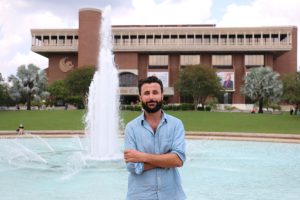
Haidar Khezri, UCF assistant professor of Arabic, has joined Indiana University scholars Gunther Jikeli and Asaad Alsaleh as a co-principal investigator in an interdisciplinary project researching attitudes among Syrian refugees in Germany. The project, funded by Indiana University’s Institute for European Studies, the IU Foundation and the Borns Jewish Studies Program, aims to explore the impact of interactions between Syrian immigrants and Germans. It is based on a series of extensive interviews conducted in three waves in 2016, 2017 and 2020–2021.
As UCF’s first assistant professor of Arabic, Khezri has played a key role in developing the university’s capacity not only to teach Middle Eastern languages and cultures, but also to conduct research in the region. In addition to his academic interest in the project, Khezri has a personal tie to the research: “Driving my personal motivations are my many colleagues and friends who became refugees in the aftermath of the Syrian civil war while I was completing my doctoral studies in Damascus. Through this project, I hope to be able to give back to the community that I appreciate dearly.”
Refugees from Syria and other war-torn countries have been making their way to Europe over the years. Germany registered 1.3 million refugees in 2015 and 2016. In addition to xenophobic reactions, refugees face local misgivings about the attitudes and values they bring as well as about their ability to integrate into Western society. These misgivings, writ large, underscore tensions between refugees and German citizens. However, the dichotomy between locals and newcomers is not a clean-cut binary. As the study has revealed, Syrian refugees are far from a homogenous group.
“In contrast to public perceptions, the Middle East, including Syria, is very diverse in terms of ethnicity and religion,” says Khezri. “For example, the situation of the Syrian Kurds is different from that of the Syrian Arabs when it comes to integration, politics, religion, anti-Semitism and many other significant issues.”
The initial interviews earned the study coverage from German and English media outlets, such as The Washington Post and Reuters, and uncovered problems that immigrants face, including housing and language barriers. Over the years, these problems may have evolved into more long-term issues, such as improving job qualifications, educating children, remaining connected to family members in other countries and establishing new friendships and roots in a country that has become increasingly less foreign.
In the third wave of interviews, Khezri hopes to gain insights about how recent migrants have integrated into German society several years after their arrival. “I am curious as to whether a direct relationship exists, and to what level, between the immigrants’ gradually improving language skills and their expectations and abilities to integrate into their adopted society,” he says.
Khezri has already observed notable differences between the migrants’ perspectives in the initial interviews as compared to more recent interviews. “Certain changes in gender perspectives have been striking and were already evident in 2017,” he says. “Women’s rights and freedoms are more robust in Germany than in Syria, a difference which conditions attitudes and behavior.”
In addition to perspectives on gender identities*, ethnicities, religious affiliations and places of origin, the research will provide insight to the impact of the COVID-19 pandemic on Syrian refugees. “It has dramatically affected immigrants and their children in terms of health, employment, education, language training and other integration measures,” says Khezri.
Ultimately, Khezri hopes to identify areas where there exists a lack of information or misconceptions among Syrian refugees and the German population. These areas can then be addressed in publications, workshops and seminars to improve the experience of refugees integrating into German society and more broadly.
*Khezri has also written about gender in other Middle Eastern cultures. Read his take on how Turkish attacks have affected Kurdish women.